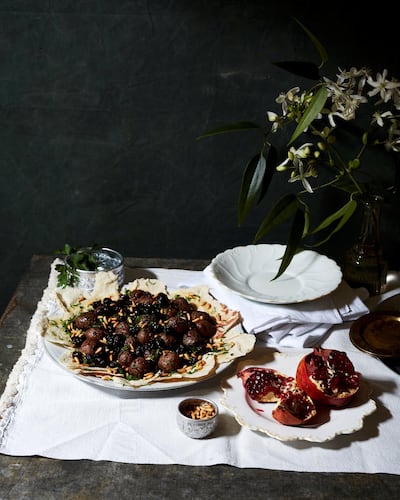To call Anissa Helou's latest publication a cookbook feels almost disingenuous. Feast: Food of the Islamic World is vast in scope, ambitious in its aims, and both scholarly and absorbing in execution.
This is the half-Lebanese, half-Syrian author’s ninth cookbook, and is the culmination of years of travel, hours of cooking, conversation and learning, as well as what sounds like some of the finest and most interesting eating experiences one could hope to have. She says that she was inspired to write the book – which has just won a James Beard Foundation Award – due to her appreciation of Islamic culture and her frustration at the way in which Islam has been vilified in the media and some political circles.
“I thought that a good way to present Islam and its people in a positive light would be through food, given the rich history, successive magnificent empires and great culture that some people have chosen to ignore,” she explains.
Over the course of 500-plus pages, Helou dives into the culinary history of the Islamic world, beginning with the birth of Islam circa AD610.
As fans of her work have come to expect, her writing manages to be witty, pithy, informed and respectful all at once, with tales of food, family, religion and culture interspersed among the 300 or so recipes.
Best for: Those looking for not just a book to cook with, but also one to pore over and learn from.
Must-try recipes: Kabab karaz (Syrian lamb meatballs with sour cherries and pomegranate molasses) and Gado gado (Indonesian vegetable and egg salad).
Recipe: Kabab karaz from ‘Feast: Food of the Islamic World’
“If there is a dish that symbolises the cooking of Aleppo, this has to be it,” writes Helou of this recipe, adapted from Syrian chef Maria Gaspard-Samra.
Ingredients
For the meatballs
450 grams lean ground lamb, from the leg or shoulder
¾ teaspoon fine sea salt
½ teaspoon Lebanese seven-spice mixture or allspice
1 tbsp unsalted butter
For the cherry sauce
1kg fresh or frozen pitted sour cherries
1 tbsp raw cane sugar
1 tbsp pomegranate molasses
For assembly
2 to 3 pita breads, each split into 2 discs and cut into medium triangles
1 tbsp unsalted butter, melted
A few sprigs flat-leaf parsley, bottom stems discarded, finely chopped
50g pine nuts, toasted in a hot oven for about five to seven minutes, until lightly golden
Method
Mix the lamb, salt and seven-spice mixture (or allspice) and shape into small balls, the size of large marbles. Melt the butter in a large skillet over medium heat and saute the meatballs just until lightly browned. Remove from the pan with a slotted spoon and set aside.
Put the cherries, sugar and pomegranate molasses in a pot large enough to eventually hold the meatballs, and bring to a bubble over medium heat.
Reduce the heat to medium-low and, stirring occasionally, simmer for 15 to 25 minutes, or until the sauce has thickened. Add the meatballs and simmer for another 15 minutes, until tender.
To assemble the dish, arrange the pita bread triangles all over a serving platter, coarse side up, making sure the pointed ends are nicely arranged on the outside. Drizzle the melted butter all over the bread. Spoon the meat and sauce over the bread. Sprinkle the chopped parsley all over, then the toasted pine nuts. Serve immediately.
Tip
You can use dried sour cherries if fresh aren’t available. Rehydrate them by soaking overnight in water: 500ml water for 400 grams of fruit. Add the soaking water to the sauce.



